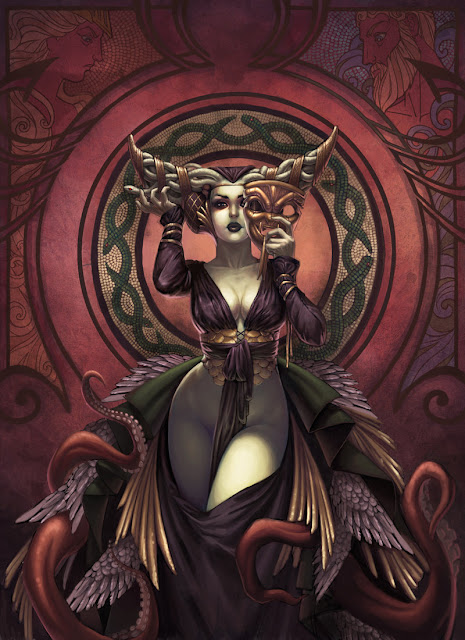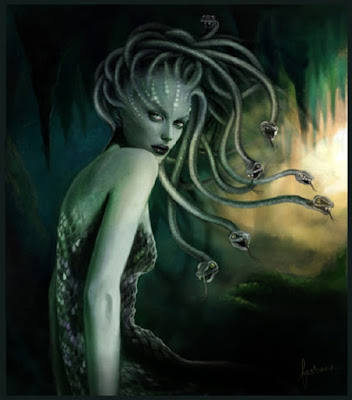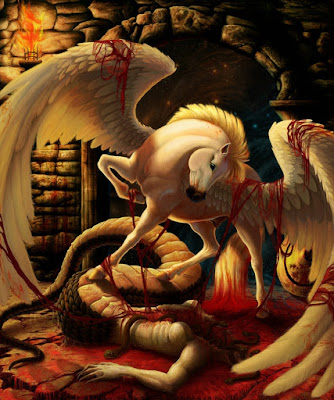Medusa was one of the three Gorgons, daughters of the sea gods Phorcys and Ceto, and sisters of the Graeae, Echidna, and Ladon. All of Medusa’s siblings were monsters by birth and, even though she was not, she had the misfortune of being turned into the most hideous of them all.
From then on, similarly to Euryale and Stheno, her older Gorgon sisters, Medusa was depicted with bronze hands and wings of gold. Poets claimed that she had a great boar-like tusk and tongue lolling between her fanged teeth. Writhing snakes were entwining her head in place of hair. Her face was so hideous and her gaze so piercing that the mere sight of her was sufficient to turn a man to stone.
It wasn’t always like that. Medusa – the only mortal among the Gorgon sisters – was also distinguished from them by the fact that she alone was born with a beautiful face. Ovid especially praises the glory of her hair, “most wonderful of all her charms.” The great sea god Poseidon seems to have shared this admiration, for once he couldn’t resist the temptation and impregnated Medusa in a temple of Athena. Enraged, the virgin goddess transformed Medusa’s enchanting hair into a coil of serpents, turning the youngest Gorgon into the monster we described above.
Soon after this, trying to get rid of Perseus, Polydectes, the king of Seriphos, sent the great hero on a quest which he believed must be his final one. “Fetch me the head of Medusa,” commanded Polydectes. With the help of Athena and Hermes, and after compelling the Graeae for Medusa’s whereabouts, Perseus finally reached the fabled land of the Gorgons, located either in the far west, beyond the outer Ocean, or in the midst of it, on the rocky island of Sarpedon. Medusa was asleep and Perseus, using the reflection in Athena’s bronze shield as a guide (so as to not look directly at the Gorgons and be turned into stone), managed to cut off her head with his sickle.
The Posthumous Fate of Medusa
Strangely enough, Medusa’s story doesn’t end with her death. In fact, one can argue that the most peculiar fragments of her biography are all posthumous.
Medusa’s Children · The Lament of the Gorgons
For Medusa was pregnant at the time of her death, and when Perseus severed her head, her two unborn children, Chrysaor and Pegasus, suddenly sprang from her neck. The Gorgons were awoken by the noise and did their best to avenge the death of her sister, but they could neither see nor catch Perseus, for he was wearing Hades’ Cap of Invisibility and Hermes’ winged sandals. So, they went back to their secluded abode to mourn Medusa. Pindar, a great Ancient Greek poet, says that upon hearing their gloomy lament, Athena was so touched that she modeled after it the mournful music of the double pipe, the aulos.
The Miraculous Head of Medusa
Now that Perseus had Medusa’s head in his bag, he went back to Seriphos. However, while flying over Libya, drops of Medusa’s blood fell to the ground and instantly turned into snakes; it is because of this that, to this day, Libya abounds with serpents. When Perseus arrived in Seriphos, he used Medusa’s head to turn Polydectes and the vicious islanders into stones; the island was well-known long after for its numerous rocks.
After this, Perseus gave Medusa’s head to his benefactor Athena, as a votive gift. The goddess set it on Zeus’ aegis (which she also carried) as the Gorgoneion. She also collected some of the remaining blood and gave most of it to Asclepius, who used the blood from Medusa’s left side to take people’s lives and the blood from her right side to raise people from the dead. The rest of Medusa’s blood – a vial containing two drops – Athena gave to her adopted son, Erichthonius; Euripides says that one of the drops was a cure-all, and the other one a deadly poison.



Comments
Post a Comment